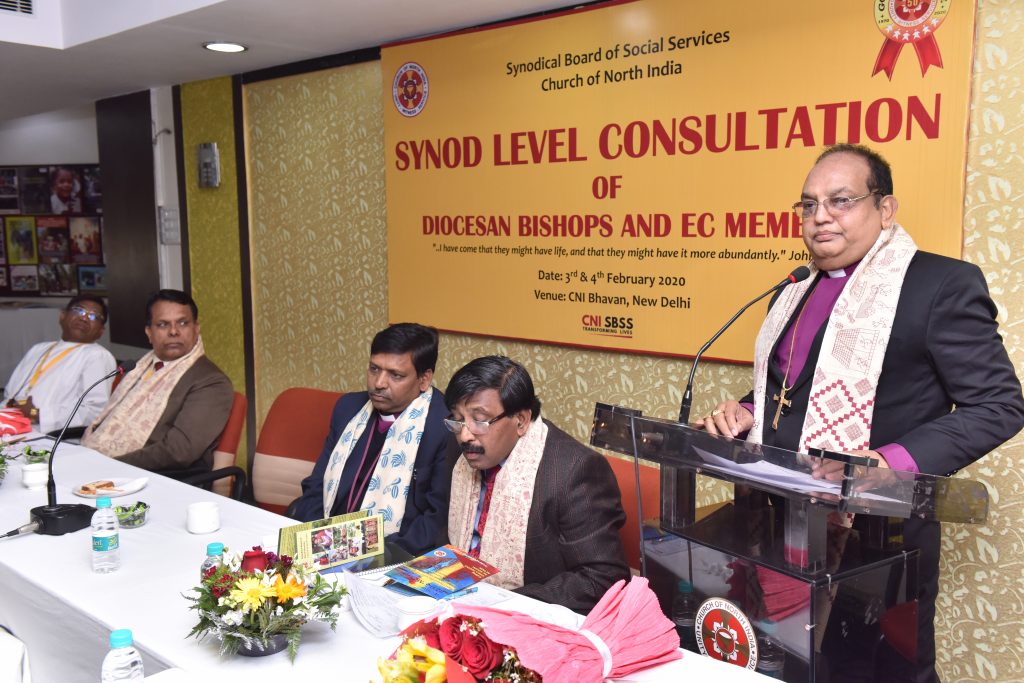SYNOD LEVEL CONSULTATION OF DIOCESAN BISHOPS AND EC MEMBERS
3rd AND 4th FEBRUARY 2020
AT CNI BHAVAN, NEW DELHI
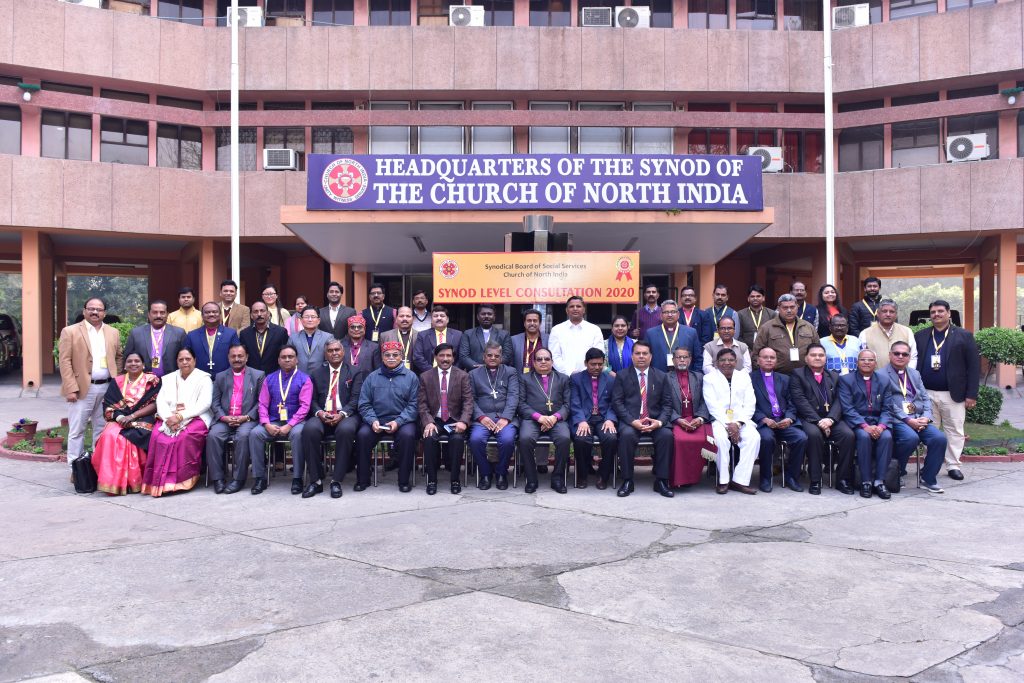
CNI SBSS held the Synod level Consultation of Diocesan Bishops & Executive Members on 3rd and 4th February 2020 at CNI Bhavan, New Delhi. The aim of the consultation was to develop a strategy of CNI SBSS to effectively enhance the ministry of justice and development in the present socio – political & economic realities of India.
The program began with the celebration of Holy Communion which was given by The Rt. Revd. M.U. Kasab. Chairperson, CNI SBSS and the message was preached by The Rt. Revd. ManojCharan, Bishop of Bhopal Diocese. The welcome and inaugural address was given by The Rt. Revd. M.U. Kasab,Chairperson, CNI SBSS. He welcomed The Most Revd. Dr. P.C. Singh, Moderator of CNI Synod and the office bearers of CNI Synod, Bishops and Executive Committee members and other dignitaries present.

The Key note Address was given by The Most Revd. Dr. P.C. Singh, Moderator of CNI Synod on New Vision of CNI Synod: New Approach of the CNI Synod & Mission Mandate in the perspective of 50 years journey of CNI. He shared that it is a special joy to see all the diocesan Bishops and Executive Committee members, CNI Synod present for this consultation. We are in the 50th year of CNI’s existence and we have experienced God’s faithfulness in this journey. Today we are here on this platform to discuss and to set priorities for the next 10 years for CNI SBSS. He highlighted the need to involve the Churches, Pastorate Committees and congregations of different dioceses and emphasized that CNI SBSS should work in all 27 dioceses. We need to generate our own resources to fulfill the mission of God and work towards making CNI SBSS self-reliant. We need to build local partners who are like-minded and would come forward to support our work and together we can fulfill the Nazareth Manifesto. The different boards like CNI SBSS and CNI SBHS (Synodical Board of Health Services) should be witnessing boards and serving the Lord and the community.

Mr. Alwan Masih, General Secretary, CNI Synod spoke on the Role of Church in Present Socio-economic and Political Context. He emphasized on the different challenges and issues faced by the country today and the Call of the Church of North India to restore the integrity of God’s creation by engaging with people and breaking down the barriers of caste, class, gender, economic inequality and exploitation of the nature. The role of the Church and boards like CNI SBSS should be to fulfill the mandate given by Jesus Christ in Luke 4:18- “The spirit of the Lord is upon me, because he has anointed me to preach Good news to the poor…”
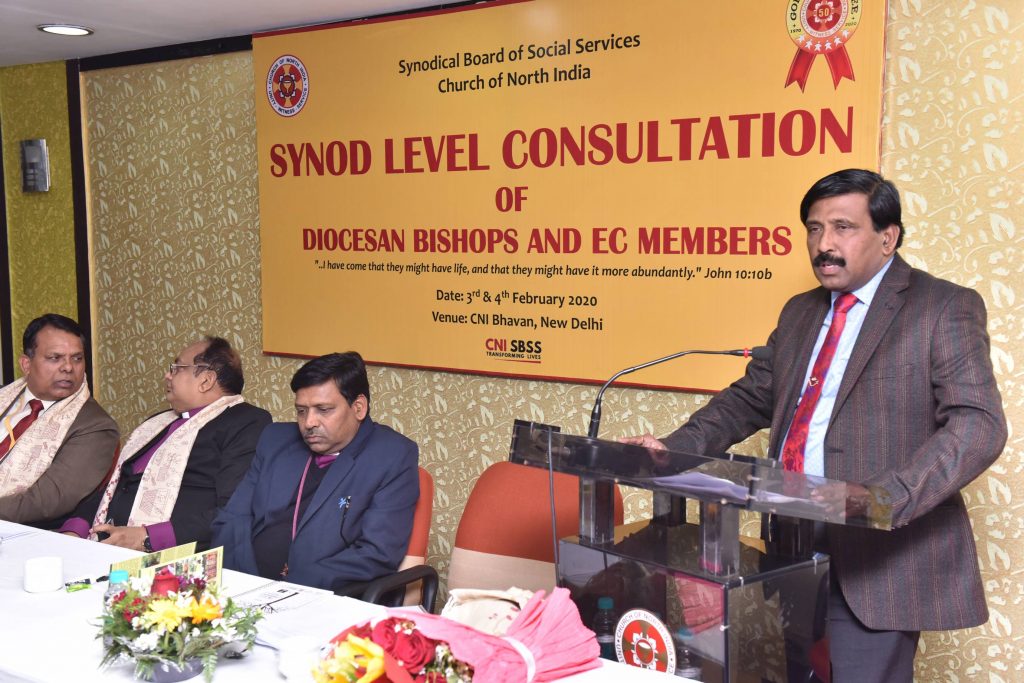
Prof. JayantAgrawal, Hony. Treasurer, CNI Synod spoke on Financial Sustainability & Accountability of CNI for development work of the poor. Church can partake in the development process and utilize its resources for upliftment of the poor and needy. He gave a presentation on how Chotanagpur diocese through DBSS is involving in the community through Self Help Groups and introducing alternative livelihood opportunities like apiculture/bee-keeping for economic development of the community.
The second day of the consultation began with Morning devotion in the Chapel with Holy Communion in which the Celebrant was Rt. Revd. Dr. Warris K. Masih supported by Rt. RevdManojCharan. The sermon was delivered by Rt. Revd. B.K. Nayak, Dy. Moderator, CNI Synod.
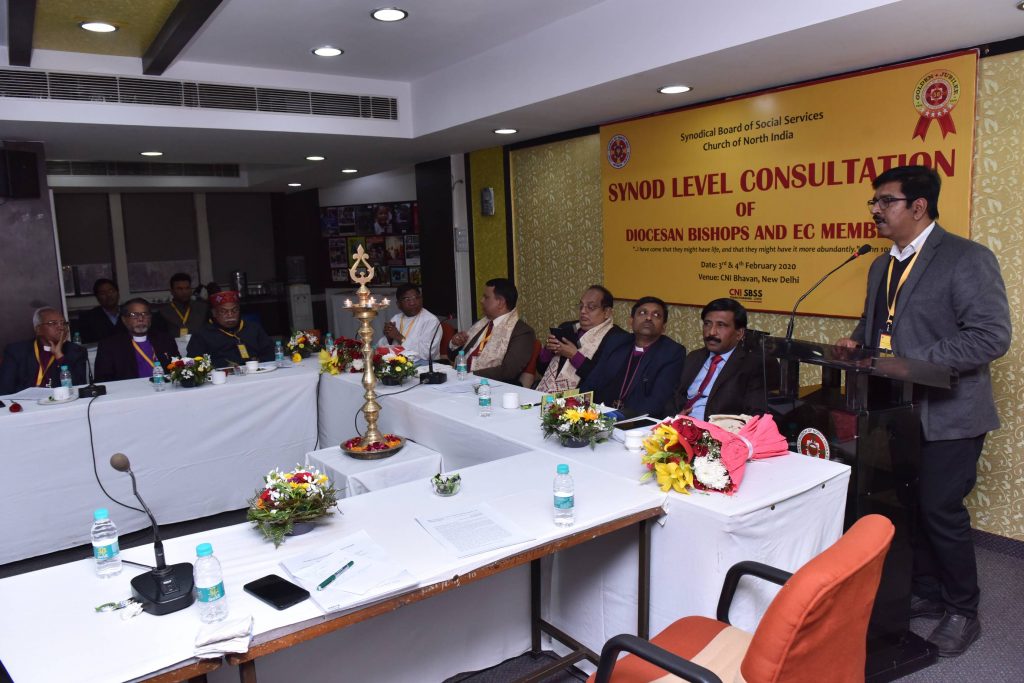
The film-“Teri Samarth Se” (With Your Might)was screened which showcased the Church Mission Engagement of diocese of Cuttack in an urban slum.Mr. SoumyaRanjanMohanty, Chief Coordinator & Secretary, CNI SBSS spoke on how the different congregations of Cuttack Diocese are involved in fulfilling the Jesus mission and working along with the community in various aspects like education, health, water and sanitation and livelihood etc.
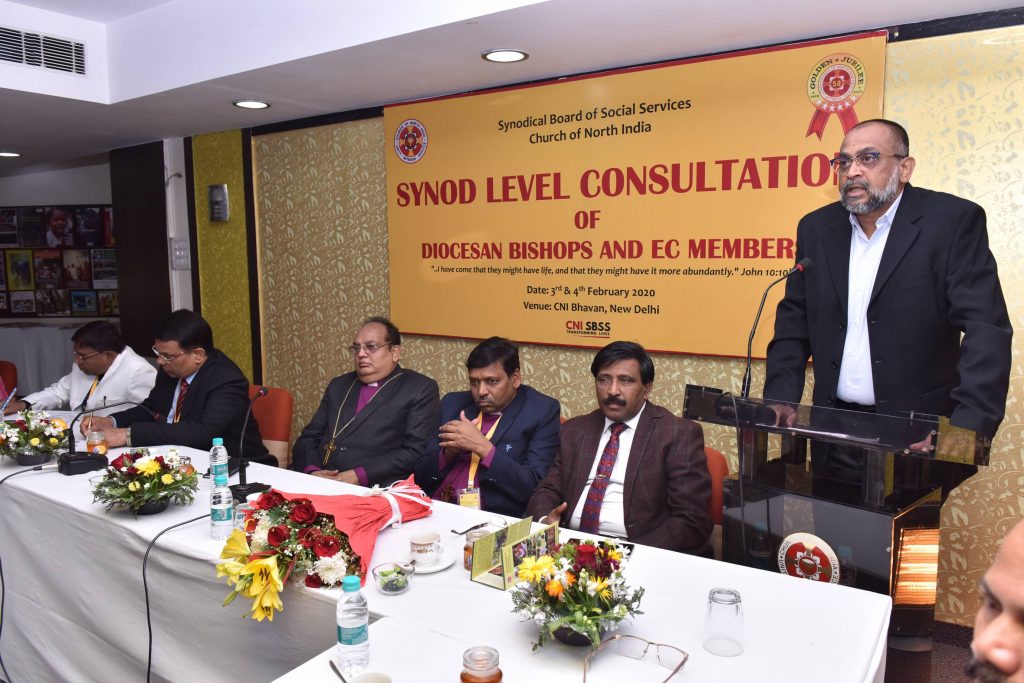
The first Guest Speaker for the day Rev. Asir Ebenizer, General Secretary of National Council of Churches in India spoke about Mission Redefinedwhere he emphasized onthe urgency of the challenging times like today and that our work should be relevant to empower the community that we serve. He challenged that the church should- “Stand up & take your cross and move onto Galilee and start serving there.”We need to increase people’s capabilities and empower them with knowledge and skills to create wealth for themselves. In all this the approach of the Church should be- Empowerment Diakoniawhere the ‘other is more important’as reflected in Jesus washing Peter’s feet in the Bible. It is the poor who we are to serve, build and empower. God was already at work when Philip was asked to enlighten the Ethiopian Eunuch riding the chariot (Acts 8:2-40). So God is at work, we just need to join Him. Empowerment is already happening out there. We need to embrace God’s movement and join it too. We need to meet that challenge.
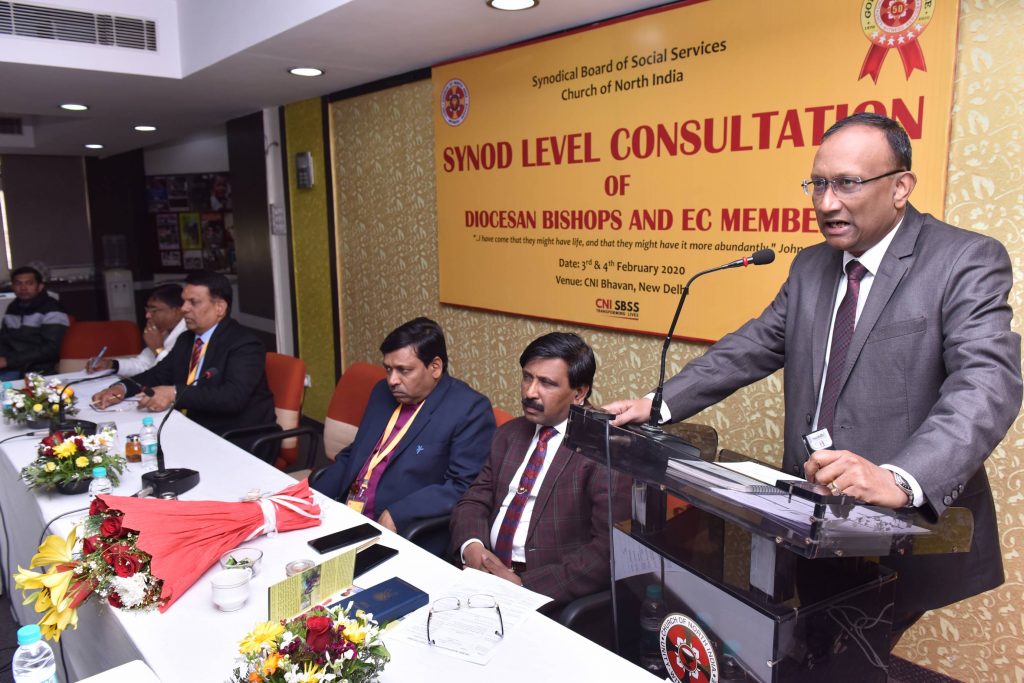
The second Guest speaker was Dr. Sanjay Patra from FMSF who shared on Civil Society Spaces in emerging Legal and Political Realities of India.He stressed that as a Church body involved in social development work, we need to be aware of the changes in legal compliances. Some of the key issues he discussed on were on Income Tax Laws, Foreign Contribution & Regulatory Act (FCRA), Goods & Services Tax (GST) and Labour Laws.
There was a group discussion and presentation on new vision and strategy development for CNI SBSS in which all the diocesan Bishops and Executive Committee members, CNI Synod participated for discussion and deliberation.
The important recommendations shared by the groups were:
Q.1 What will be the priorities of CNI SBSS in next ten years?
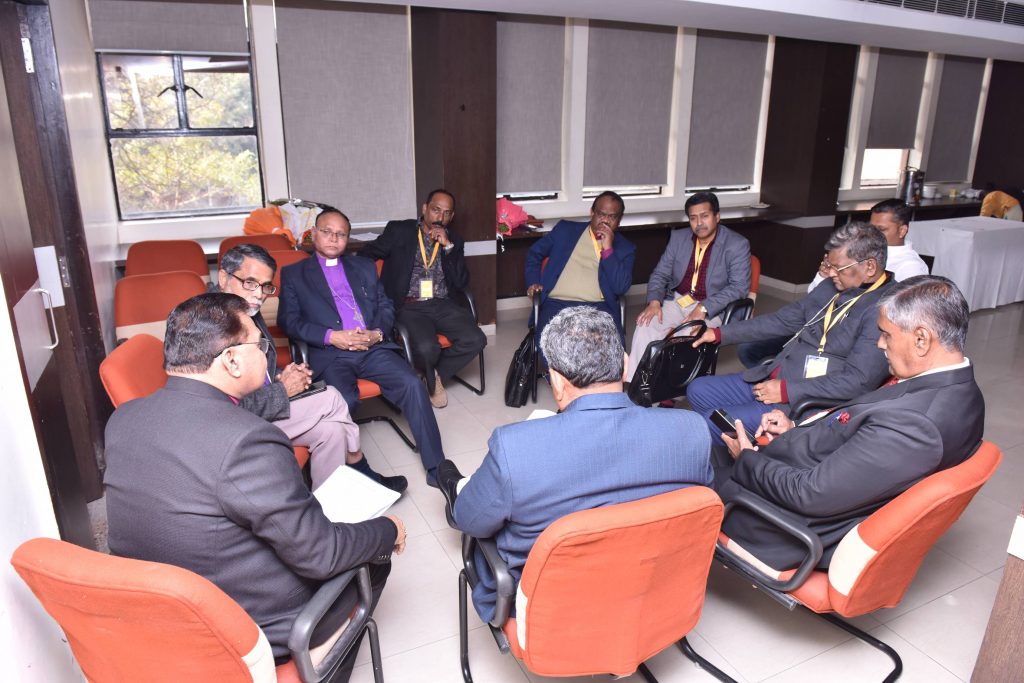
- Strengthen the Church Mission Engagement (CME) program by building models and scaling up
- Reaching to unreached areas, dioceses and most marginalized communities
- Bring in Volunteer culture by capacity building of congregation and youth and to create leadership to carry Jesus mission to communities
- Collaborate with Govt. on various schemes and being a bridge between communities and govt.
- Building capacity of the Church youth, clergies and lay leaders in creating human resources and financial resources .
- Building vibrant network of marginalized communities
- Developing robust systems for accountability & transparency
Q.2 How to make CNI SBSS self-reliant? How to raise local resources?
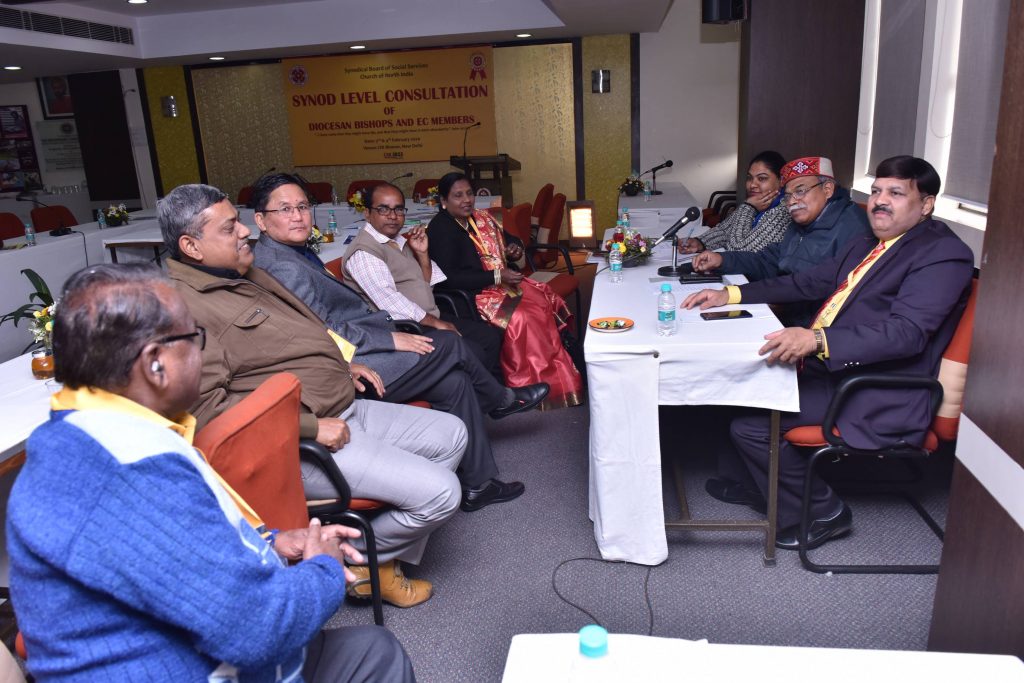
- Resource mobilization-explore Government Program funds& Microfinance to make communities self-reliant
- Explore Corporate Social Responsibility CSR funding for partnerships and more dependency on local funding support
- Motivate congregation members to get the benefit of 80G tax rebate by contributing to CNI SBSS
- Supporting Dioceses in drafting project proposals for local level partnerships and with traditional overseas partners
- Developing plans for income generation by making the best use of different properties and resources at diocese .
- Building corpus of CNI SBSS to support programs
The Most Revd. Dr. P.C. Singh, Moderator of CNI Synod also shared his recommendations for CNI SBSS:
- SBSS must be visible in the larger context of church community
- Prepare a detailed plan on resource generation so that CNI SBSS is self-reliant
- SBSS should make efforts to reach to 27 dioceses and do programs with them
- SBSS programs should be published in North India Church Review (NICR) magazine
- Networking with like-minded local organizations to work in partnership with them
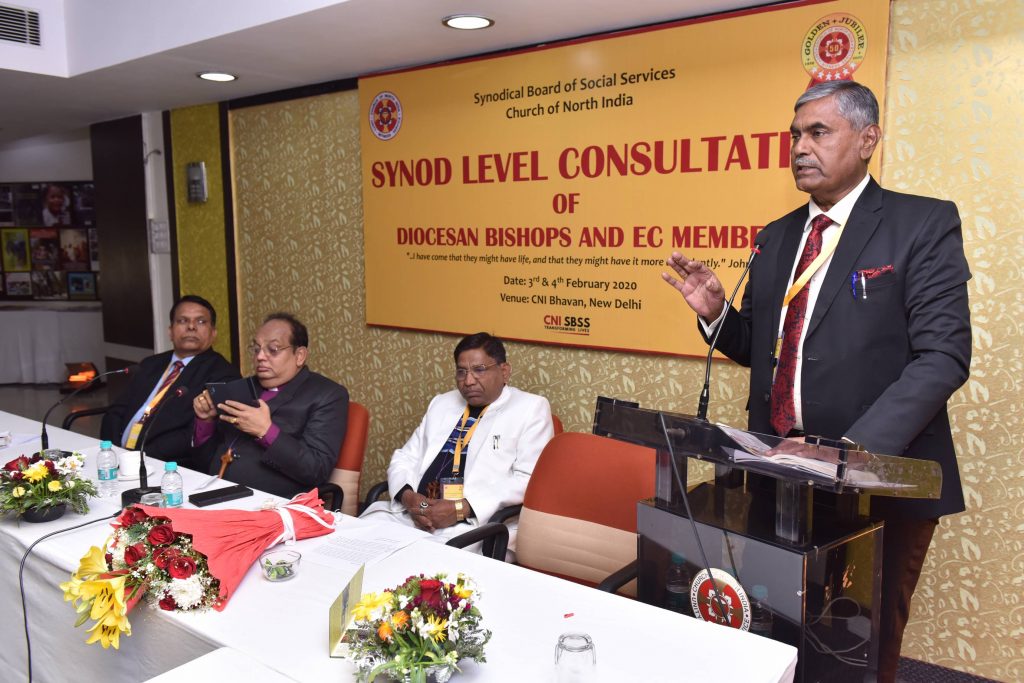
Mr. Suresh C. Jacob, Treasurer, CNI SBSS reminded everyone of the legacy of The Church of North India and the vision of our forefathers to be a united church living out its faith and mission. This legacy needs to be passed on to the future generations as well.At present the various boards which were established by CNI is non-functional because of non-availability of funds and other issues, only CNI SBSS is functioning. He emphasized the dire need of CNI SBSS becoming self-reliant and generating resources to continue its work towards fulfilling its vision and mission.
In his concluding remarks The Most Revd. Dr. P.C. Singh, Moderator of CNI Synod said that “this is the beginning of setting of the priorities of CNI SBSS for next ten years. As this is an important consultation to initiate the thinking and develop the priorities, CNI SBSS needs to conduct for follow ups taking suggestions from the consultation. We should have a bigger forum with participation of Diocesan leadership and different church organizations working in Indiato share their stories and experiences. With series of such consultation the priorities will be finalized.”
The Vote of Thanks was given by The Rt. Revd. M.U. Kasab, Chairperson, CNI SBSS. The Closing prayer was offered by The Rt. Revd. Sameer Isaac Khimla, Bishop of Durgapur and the benediction was given by The Most Revd. Dr. P.C. Singh, Moderator of CNI Synod.

